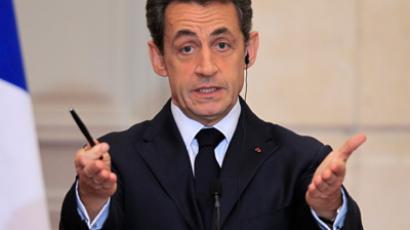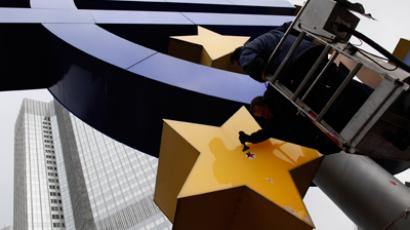Rescue route or power grab? Euro splits EU
If the 17 eurozone countries manage to hammer out a pact, they may be able to impose more centralization of economic power on the wider, 27-member EU. That's the view of Philip Booth from the Institute of Economic Affairs.
“Not surprisingly, the French and Germans – in slightly different ways – are trying to use this euro crisis as a means to centralize even more power within the EU institutions,” Booth told RT.The situation is a dangerous one for non-eurozone EU countries like Britain, because any refusal to sign a “fiscal union” treaty might create a two-speed Europe, leaving those on the peripheries with little influence. But Booth believes that a multispeed European Union is, in many senses, a good outcome. “I hope that a two-speed Europe is the outcome of this, and I hope that a more decentralized Europe is the outcome of this,” he said. “David Cameron has got to negotiate very hard, but from a position where he is outside the main negotiations, to try to reclaim other powers that are currently centrally held by the EU.”One of the powers Brussels could wield is the authority to impose austerity measures on countries it bails out. When individual governments did this to their own people, the move was met with large-scale protests. However, Booth says there is no easy and centralized way out of this mess “that does not involve individual member governments facing up to their own problems.”“The only real sanction that the eurozone countries can impose on an offending member is some kind of fine, which actually makes the situation worse,” he explained. “That was rejected when the European Stability Pact was first drafted. It is up for discussion now, but it is no more obvious how this would work in the future.”
Robert Oulds, director of the Bruges Group, says another power individual eurozone countries will lose is the sovereign right to elect their own governments.“They will not have the authority to elect or dismiss their own governments,” he said. “We have seen that the EU has effectively replaced the governments of Greece and Italy with non-elected governments, where they are putting technocrats who will do the EU’s bidding.”
‘First-class passengers in a Titanic’
EU politicians seem oblivious to the consequences of the current economic situation, believes economic analyst Michael Mross. “They behave like first-class passengers on a Titanic that is already sinking,” he said. “And what politicians are saying right now, is, ‘OK, we have time. Everything is alright.’ But this ship is sinking and there is no solution to keep it afloat."Mross is pessimistic about the prospects of finding a solution at this week's EU summit. “I cannot hear anything which comes close to a solution. The only thing they are producing there in Brussels is a catastrophe, a catastrophe of rescue efforts. And this will lead next week more or less to chaos, catastrophe – and collapse of the whole system, possibly.”














